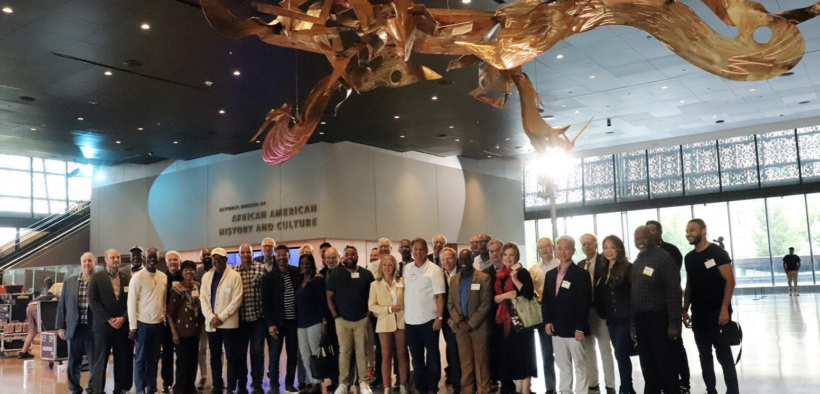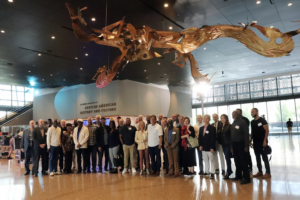Let’s Talk, a New Racial Unity Initiative, Takes Evangelical Leaders on Tour of Black History

WASHINGTON (RNS) — For missionary Doug Gentile, it was seeing the “shackles for tiny children” used during American slavery.

Main Photo: Visitors with a Let’s Talk initiative pose together at the National Museum of African American History and Culture, Sept. 13, 2022, in Washington. RNS photo by Adelle M. Banks
For seminary professor Darrell Bock, it was confronting the specificity of the list of “Black codes” that restricted the lives of Black people after slavery ended — mandates in many states, for instance, that they sign annual labor contracts on pain of arrest.
These revelations, and many more, came out of an early morning tour Tuesday (Sept. 13) of an otherwise empty National Museum of African American History and Culture for 42 Black, white and Asian American evangelical Christian leaders, sponsored by an initiative called Let’s Talk, which aims to foster racial unity among evangelicals.
“A lot of folks had some real eye-opening moments at the museum,” said Bishop Derek Grier, founder of Let’s Talk, the day after the tour.
The visitors, who included Council for Christian Colleges & Universities President Shirley V. Hoogstra, public relations executive and longtime Billy Graham spokesman A. Larry Ross and National Association of Evangelicals President Walter Kim, followed a museum guide, most listening silently, past Harriet Tubman’s hymnal, a dress made by Rosa Parks at the time of her bus protest and an exhibit about the bombing of Birmingham’s 16th Street Baptist Church, which occurred 59 years nearly to the day before the tour.
Access to MinistryWatch content is free. However, we hope you will support our work with your prayers and financial gifts. To make a donation, click here.
Their guide explained that enslaved Blacks regularly attended “what could be called church” secretly in brush arbors, because it was illegal for them to preach or gather during the time of slavery.
But there were other lessons about how the slave experience formed the basis of what some view as racial injustices today. “Most people did not realize the economic impact slavery had on the founding of the United States of America and one of the plaques said something along the lines of 60% of the U.S. economy was based on slavery,” said Grier, who is Black.
The initiative comes in answer to the rejection by some evangelicals of the idea of systemic racism. A 2019 survey found that, when asked if the country has historically been oppressive for racial minorities, 82% of white evangelicals did not agree.
Gentile, founder of Alexandria, Virginia, nonprofit James 2 Association, said the tour bolstered his organization’s goal “to use the Bible to fight back against these white-rage, rear-guard attempts to cancel discussions of racial history and racial justice in the public schools.”
Pastor Lee Jenkins, the leader of the nondenominational Eagles Nest Church in Roswell, Georgia, and co-chair of the regional organization One Race, said he appreciated how some white visitors to the museum were affected by what they saw.
“It shook some of them to their core,” he said. “And that was encouraging because it showed that they had compassion and they were willing to acknowledge that America has had a problem in this area and this problem of racism and injustice needs to be addressed.”
The Let’s Talk initiative was launched at a banquet at the Museum of the Bible in November, and since then more than 500 people have signed its “Statement of Change,” which says in part: “We believe both the spirit and clear moral imperatives of scripture require the Christian community to lead the way in defeating racial bigotry.”
Some of the signers have also committed to meeting regularly — at first monthly and now quarterly — over Zoom to continue conversations about racial tensions.
Many of the participants already work on race issues through their churches or organizations. But Kim said Let’s Talk was a chance to learn, share and network together. “There’s a desire for us not to be territorial about this work,” he said. “This is gospel work, and it is really important for us to be in collaboration with others, sometimes applauding what they’re doing from afar, other times collaborating closely.”
Bock, a white New Testament scholar who has taught at Dallas Theological Seminary for 41 years, said the museum tour helped orient the work the group has ahead. He said their focus on unity in Christ is a starting point for conversations about polarization in the country, adding that discussions of race should not be separated from the church’s testimony.
“Most of the evangelical church is about individual salvation and a person’s individual walk with God,” he said. “This is all about larger community structures and being able to think through that space and to help people see that space is an important part of the conversation.”
Kim said his organization expects to support Grier’s plans for a “Unity Weekend” in June 2023, when churches will cooperate across racial and denominational lines on service projects and hear sermons about unity.
In March, the NAE hired a director of its new Racial Justice & Reconciliation Collaborative who has been meeting with leaders of local and regional initiatives to address racial injustice such as One Race. The NAE, an umbrella organization for a wide range of evangelical organizations, hopes to foster networks that address not only what the churches can do within their own structures but beyond them to transform their communities.
Grier, who is pastor of an independent church in Dumfries, Virginia, said his reasons for founding Let’s Talk are based on biblical lessons about collaboration, including Jesus’ teaching in the Gospels “that they may be one” and that “a house divided against itself will not stand.”
“I have children I love, people I love that are going to be here a lot longer than I will be,” said the 57-year-old pastor. “And I want to make sure that I do my part in trying to make this a better country for the young people that are going to follow us.”



